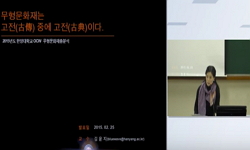국가유산법(2024.5.17.시행)에 관한 설명으로 부각되는 내용은 ‘문화재가 재산적 개념이므로 이를 국가유산이라는 개념으로 대체한 것’이라는 설명이다. 그러나 재산적 개념을 탈피하고자 ...
http://chineseinput.net/에서 pinyin(병음)방식으로 중국어를 변환할 수 있습니다.
변환된 중국어를 복사하여 사용하시면 됩니다.
- 中文 을 입력하시려면 zhongwen을 입력하시고 space를누르시면됩니다.
- 北京 을 입력하시려면 beijing을 입력하시고 space를 누르시면 됩니다.
부가정보
국문 초록 (Abstract)
모든 전승유산과 예술적 자산의 주인이자 주체는 ‘사람들’이지 국가권력이 아니다. 그러나 국가유산법에서 국민은 철저하게 타자로 설정되어 있다. 국가의 소유물인 국가유산을 위해 국민은 동원되고 교육받고 계몽되고 시혜 받는 존재로 설정되어 있다. 설사 이 법이 상당부분 기존 문화재보호법을 그대로 이어받고 문화재 용어를 국가유산 용어로 바꾼 것이라 해도, 용어가 바뀜으로서 전반적인 법규의 태도가 국가주의적으로 바뀐 점은 지적되어야 한다.
국가유산법(2024.5.17.시행)에 관한 설명으로 부각되는 내용은 ‘문화재가 재산적 개념이므로 이를 국가유산이라는 개념으로 대체한 것’이라는 설명이다. 그러나 재산적 개념을 탈피하고자 하여 대체한 용어가 왜 국가를 내세운 ‘국가의 유산’ 혹은 ‘국유화된 유산’의 의미를 담고 있어야 하는 이유에 대한 설명은 어디에도 없다. 국가가 전면에 나서서 유산을 전유(專有)한다는 태도의 위험성에 대한 경계는 찾을 수 없다.
모든 전승유산과 예술적 자산의 주인이자 주체는 ‘사람들’이지 국가권력이 아니다. 그러나 국가유산법에서 국민은 철저하게 타자로 설정되어 있다. 국가의 소유물인 국가유산을 위해 국민은 동원되고 교육받고 계몽되고 시혜 받는 존재로 설정되어 있다. 설사 이 법이 상당부분 기존 문화재보호법을 그대로 이어받고 문화재 용어를 국가유산 용어로 바꾼 것이라 해도, 용어가 바뀜으로서 전반적인 법규의 태도가 국가주의적으로 바뀐 점은 지적되어야 한다.
다국어 초록 (Multilingual Abstract)
Regarding the enforcement of the Framework Act on National Heritage (May 17, 2024), the purpose is explained as ‘since the term cultural property in the existing Cultural Property Protection Act is a property concept, it has been replaced with the c...
Regarding the enforcement of the Framework Act on National Heritage (May 17, 2024), the purpose is explained as ‘since the term cultural property in the existing Cultural Property Protection Act is a property concept, it has been replaced with the concept of national heritage.’ However, there is no explanation as to why the term replaced in order to escape the property concept should contain the meaning of ‘national heritage’ or ‘nationalized heritage’ that emphasizes the state. There is no warning about the danger of the state monopolizing heritage. The owner and subject of all traditional heritage and artistic assets is ‘people’, not state power. However, in the Framework Act on National Heritage the people are thoroughly set as ‘others.’ The people are set as beings who are mobilized, educated, enlightened, and benefited for the national heritage that is the property of the state. Even if this law is largely a continuation of the existing Cultural Property Protection Act, it should be pointed out that the overall attitude of the law has changed to a nationalistic one due to the change in terminology.
동일학술지(권/호) 다른 논문
-
- 한국음악사학회
- 최선아
- 2024
- KCI등재
-
- 한국음악사학회
- 하현주
- 2024
- KCI등재
-
- 한국음악사학회
- 송지원
- 2024
- KCI등재
-
국악사 양성소와 국립국악고등학교의 초창기 여성 거문고 연주자 고찰
- 한국음악사학회
- 유미영
- 2024
- KCI등재





 KCI
KCI KISS
KISS






